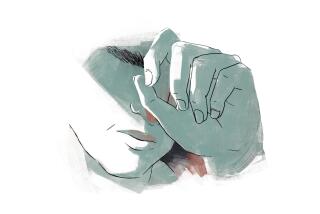A Remedy for Substance Abuse
- Share via
Four doctors told him he would die if he didn’t stop drinking. One even graphically described how cirrhosis would turn his liver into gristle, how he would bleed to death from ruptured organs. But he didn’t change his habits until he lost his home and family and became a street person.
“It didn’t faze me,” said the Los Angeles man, now 58 and sober for the past 21 years. “The other part of the disease is it’s a built-in denial. It can’t happen to me. It won’t happen to me.”
But despite the evasions and resistance of such drug- and alcohol-dependent patients, doctors must persist in trying to recognize and help them, according to the conclusions of a national study being released today by the Minnesota-based Hazelden Foundation, a nonprofit recovery and educational organization. The study of 500 family practice, internal medicine and general practice physicians showed that despite a high level of confidence in their own ability to diagnose alcoholism and drug abuse, many American doctors still underestimate the health damage caused by chemical dependency, and few regularly discuss substance abuse.
More than half of the physicians surveyed said they believe that few of their patients have chemical dependency-related health problems even though it is estimated that an astonishing 25% to 40% of people in general hospital beds are being treated for complications of alcoholism.
Drinking contributes to nearly 100,000 deaths every year, including 40,000 traffic fatalities, according to the National Council on Alcoholism and Drug Dependency. There are an additional 8,500 drug-related deaths annually.
Besides liver disease, drug and alcohol use can lead to cardiovascular disease, pancreatitis, respiratory infections, pneumonia, increased risk of cancer, hormonal deficiencies, sexual dysfunction and infertility.
“It makes sense that in order to intervene at the earlier stage of this illness, physicians would need to be persistent in asking questions and making this a topic of discussion during each clinic visit,” said Timothy Sheehan, executive director of Hazelden Recovery Services, a clinical branch of the foundation. Now, he added, many ask questions only when there has been a “significant happenstance,” such as a car accident or advanced liver problems.
In the survey, less than a quarter of the doctors said they talk with patients about their alcohol or other drug use during a consultation. Instead, 43% said they discuss it only “when an event warrants it.”
Physicians need better training, Sheehan said. The survey showed that 63% spent fewer than 20 hours in medical school learning about chemical dependency. An additional 35% indicated that they had devoted fewer than 10 hours to the subject in medical school.
“It’s still a world of darkness for most of them,” said Edward Rabinowitz, program director for Hazelden’s physicians-in-residence program in New York. The program offers five days of training for third- and fourth-year medical residents in Hazelden’s halfway house for chemical dependency.
“We’re teaching the physicians about the attitudes of the alcoholic or drug addict, the language of the addict, how the addict uses their defenses--denial or anger--to frustrate the physician. Most physicians don’t have a clue as to what’s going on except the person is manipulative, frustrating, difficult or very charming.”
If doctors do not engage patients about their drug dependency, patients’ problems recur and patients become progressively sicker, using up scarce hospital resources and insurance benefits, Rabinowitz said. “If you don’t do some hands-on tutorial or mentor training of younger physicians, they don’t feel competent to talk to the patient who is set up to deny, manipulate or avoid. They feel too ashamed, too embarrassed or too stigmatized by what they’re doing. It’s a dance the patient and doctor do, basically circling the central issue, but never touching it.”
Hazelden’s free brochure, “Alcoholism and Drug Addiction: A Physician’s Guide,” may be obtained by calling (800) I-DO-CARE.
The brochure includes a so-called CAGE test, which screens patients for possible drug dependency: “Have you ever felt you should Cut down on your drinking? Have people Annoyed you by criticizing your drinking? Have you ever felt Guilty about your drinking? Have you ever had a drink first thing in the morning as an Eye opener to steady your nerves or get rid of a hangover?”
If a patient answers “yes” to at least two of the questions, he or she is at risk of having a problem with alcohol.






